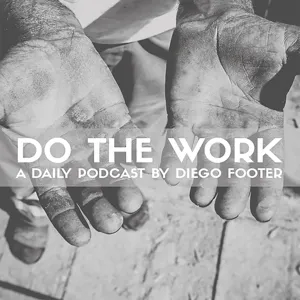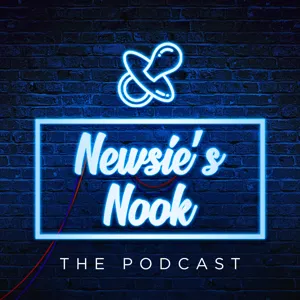Podcast Summary
CVS Health's Transformative Healthcare Services and Leesa's Focus on Sleep: CVS Health is revolutionizing healthcare through partnerships offering in-person, virtual, and mental health services. Leesa prioritizes sleep for overall health with high-quality mattresses and a risk-free trial period.
CVS Health is transforming the healthcare landscape by offering comprehensive services through various partnerships. These services range from in-person care at select locations with Oak Street Health and CVS Pharmacy, to virtual consultations, in-home evaluations, and mental health support through Aetna. Meanwhile, Leesa emphasizes the importance of good sleep for overall health and offers high-quality mattresses with free delivery and a 100-night trial period. In the realm of psychology, Dr. Scott Barry Kaufman's podcast explores the intricacies of the mind, brain, behavior, and creativity through insightful conversations with esteemed guests. David Epstein, author of "The Sports Gene," shares his curiosity about the factors contributing to athletic excellence, which led him to investigate the role of nature and nurture in shaping individual differences. Both Epstein and Kaufman's work demonstrate a deep fascination with understanding the complex interplay of nature and nurture in various aspects of life.
Exploring real differences and optimizing outcomes: Instead of focusing on preconceived notions, it's crucial to consider scientific evidence and perspectives to optimize outcomes for all, acknowledging the presence of bias even among scientists and journalists.
Instead of focusing on staking out ground based on preconceived notions, it's essential to explore real differences between people and use them to optimize outcomes for all. Both parties in this conversation agree on the importance of considering scientific evidence and the perspectives of those directly involved in the issue. However, they acknowledge the presence of bias, even among scientists and journalists. A concerning example was shared about researchers hiding data in fear of negative implications, particularly regarding ethnic differences. This conversation will delve into the interconnectedness of nature and nurture, exploring specific examples across various domains, aiming to foster a productive and unbiased dialogue.
The correlation between initial ability and trainability is not always clear-cut: Individuals with lower initial abilities can still achieve impressive improvements with the right training. Ability is not just about potential, but also about adaptability and the capacity for growth.
The correlation between an individual's initial ability in a specific sport and their ability to be trained to excel is not always clear-cut. The speaker's personal experience as a runner illustrates this concept well. Despite being initially less talented than his teammate, the speaker was able to rapidly adapt and surpass him with training. This finding challenges the common notion that ability is fixed and that potential can be easily determined by initial performance. In fact, some studies in exercise genetics have shown no correlation between baseline ability and ability to be trained for aerobic capacity. This means that individuals with lower initial abilities can still achieve impressive improvements with the right training. Therefore, it's essential to recognize that ability is not just about potential, but also about adaptability and the capacity for growth. The key is to identify which skills have a correlation between initial ability and trainability, and then to use that information to help individuals maximize their potential through targeted training and support.
Understanding individual variability in learning and athletic improvement: IQ measures learning rate, not ability to improve. 'Fast risers' and 'slow bakers' exist in athletics. Innate characteristics, self-regulatory behavior, and genetics impact improvement potential. Reaction times are not reliable indicators of athletic potential.
The ability to improve and the rate of improvement are not the same thing. In an educational context, IQ measures the rate of learning, but it doesn't determine trainability. Some individuals may be slower learners, but still capable of improvement. The UK Athletics uses terms like "fast risers" and "slow bakers" to describe this variability. Innate characteristics and self-regulatory behavior can also play a role in an individual's ability to improve. One surprising discovery was that the dopamine system, which is involved in pleasure and reward, can also be driven by physical activity due to genetic differences. This was a voluntary act I had assumed, but it has important genetic components. Another surprising finding was that reaction times, once thought to be a reliable indicator of athletic potential, are actually largely useless. For instance, Albert Pujols, a renowned Major League Baseball hitter, had a below-average reaction time compared to a group of college students. These discoveries highlight the complexity of talent selection and the importance of recognizing individual variability.
The Impact of Innateness and Initial Advantages on Development: Innateness and initial advantages, like the 'Matthew Effect,' can provide a head start, but deliberate practice and psychological factors are crucial for maximizing potential in various domains, including sports and education.
The concept of innateness and the role of initial advantages, such as the "Matthew Effect," can significantly impact an individual's development in various domains, including sports and education. The "Matthew Effect" refers to the idea that someone born with an outlandish advantage, like the super baby with excessive muscle development due to a gene mutation, can lead to a cascade of benefits and opportunities. However, it's essential to recognize that these advantages do not guarantee expertise or success on their own. Instead, deliberate practice and psychological factors, like confidence and self-efficacy, play crucial roles in maximizing potential. Regarding sports development, deliberate practice, or systematic targeted activities, is essential but often misrepresented. While it's crucial for improving skills, it's not the only factor. Studies claiming that 10,000 hours of practice are necessary and sufficient for expertise can be misleading when they are based on highly selected subjects or restricted ranges, which can't be falsified and limit the generalizability of the findings.
Focusing on one variable can lead to incomplete conclusions: Both practice and other factors, such as genetics and motivation, contribute to performance in various domains.
Focusing on a single variable, such as deliberate practice, and ignoring other factors can lead to incomplete or misleading conclusions. Using the example of basketball players, height and practice both play important roles in performance. However, the relationship between these variables can change depending on the context of the study. In the case of basketball, a high correlation between height and points scored is observed when looking at the entire population, but it reverses to a negative correlation when only NBA players are considered. This is because height becomes less important for scoring points in the NBA due to the high level of competition. Similarly, scientists and journalists can fall into the trap of focusing on one variable and ignoring others. For instance, some may argue that deliberate practice is the only factor that matters, while others may claim that genetics are the sole determinant of success. However, both practice and genetics, among other factors, contribute to performance in various domains. Moreover, motivation and inspiration are crucial for consistent and effective deliberate practice. An unmotivated or uninspired individual is unlikely to engage in deliberate practice over the long term. As human endeavors become more competitive, having a clear vision of one's future self can help overcome obstacles and maintain focus on the long-term goal.
The power of visualizing one's future self: Visualizing future self can motivate individuals, especially children, to handle setbacks and achieve goals. Studies like the Groningen studies reveal its importance in sports and weight loss, highlighting the benefits of tracking physical maturation and self-regulatory behavior.
Having a clear vision of one's future self can help individuals, especially children, handle setbacks and motivate them towards achieving their goals. This principle, supported by studies like the Groningen studies, can apply across various fields, including weight loss and sports. The importance of these studies lies in their high quality and long-term focus, yet they are often overlooked compared to case studies and cross-sectional research. In sports, for instance, the Groningen studies revealed that tracking physical maturation and self-regulatory behavior in young athletes can help identify potential and prevent premature deselection. Additionally, physical characteristics like minimum speed in shuttle runs at a young age can predict whether an athlete will make it to the top level. Overall, having a strong sense of future self can lead to better motivation, self-reflection, and ultimately, success.
The power of self-reflection and self-determination in talent development: Successful individuals in any domain reflect on their growth, take accountability, and orchestrate their own development through continuous reflection and trial-and-error, in addition to leveraging their natural abilities.
Successful individuals, whether in the realm of talent development or basketball, exhibit a strong sense of self-determination and reflection. Maria Elfring Gemser, an expert in talent studies, emphasizes the importance of reflection in the development of young, talented individuals. They don't leave their growth solely in the hands of coaches or others; instead, they take accountability and orchestrate their own development through continuous reflection and trial-and-error. This aligns with deliberate practice, which involves finding and focusing on areas for improvement, rather than aimlessly engaging in activities. Physical attributes, such as height and wingspan, also play a role in success, particularly in basketball. However, it's the combination of these natural abilities and a relentless drive for self-improvement that sets exceptional individuals apart. Kobe Bryant, for instance, though not exceptionally tall, stood out due to his impressive athleticism and unwavering dedication to his craft. These principles, applicable across various domains, underscore the importance of self-reflection, autonomy, and a strong work ethic in achieving success.
Elite athletes driven by intrinsic motivation and hormonal differences: Elite athletes, such as Kobe Bryant and Michael Jordan, are motivated by an intrinsic desire to win and improve, fueled by high testosterone levels. Hormonal differences contribute to physical advantages for men in sports, necessitating separation for fair competition and equal opportunities for women.
Athletes like Kobe Bryant and Michael Jordan continue to push themselves to the limit, not for monetary gain or to prove others wrong, but because of their deep-rooted obsession with winning and improving. This intrinsic motivation, driven in part by high levels of testosterone, sets elite athletes apart and contributes to their success. Additionally, the physical differences between men and women, primarily driven by hormonal differences, result in significant advantages for men at the highest levels of sports. Separating males and females in sports allows women to compete on a level playing field and provides opportunities for them to excel.
Complexities of human biology and sports: Despite physical differences, genetic conditions allow females to compete in male-dominated sports, but considering Africa's genetic diversity is crucial to understanding potential race differences, and disproportionate representation of certain racial groups in specific sports adds complexity to the issue.
While there have been occasional instances of women competing in traditionally male-dominated sports like golf and basketball, the lack of regular female participation is largely due to the physical differences between men and women. However, there are rare genetic conditions where individuals may have XY chromosomes but develop as females, and these individuals can have an advantage in elite sports. Regarding race, the author emphasizes that almost all of humanity's genetic diversity is contained within Africa, and it's essential to consider this before discussing potential race differences. The author also mentions the disproportionate representation of certain racial groups in specific sports, such as Jamaican sprinting. Overall, the discussion highlights the complexities of human biology and the challenges of creating clear-cut categories in sports.
Environment and genetics shape athletic success in running: Elite runners from specific regions have distinct physiological adaptations due to their environments, but opportunities and cultural drives also play crucial roles in their success.
Environmental and genetic factors play a significant role in the success of elite athletes, particularly in running. Black athletes from a specific area on the coast of West Africa have dominated short sprints in the Olympics since 1980, while long-distance running is dominated by a minority tribe in Kenya, the Kalendas. These two groups, despite being black, have distinct physiological adaptations due to their environments. The Kalendas, for example, have longer, thinner limbs for cooling in their hot and dry climate, allowing them to use less oxygen and swing their legs more efficiently. However, their running success is not solely due to their physiology; their lack of opportunity cost and strong cultural drive to compete contribute significantly as well. For talent development programs, the focus on early indicators of potential may be misguided. Instead, creating opportunities and changing the culture to encourage training and competition could lead to the discovery and success of overlooked talent. For instance, Dennis Kimeto, a farmer with no running experience, became a world record marathon runner after being discovered and trained by another runner. Such stories highlight the importance of a holistic approach to talent development.
It's never too late to learn new skills and pursue a fulfilling career: People, regardless of age or background, can develop new skills and succeed in their chosen careers, challenging the notion of specializing in one area from a young age.
People, regardless of age or background, have the potential to develop new skills and pursue fulfilling careers. The idea of specializing in one area from a young age and accumulating 10,000 hours of practice, popularized by Malcolm Gladwell, has not taken hold in certain communities, such as the Western Rift Valley. Individuals like Dennis Camuto, who achieved world records later in life, prove that it's never too late to try something new and succeed. Additionally, people often underestimate their abilities and what they can accomplish, even within the limits of their genetic makeup. Ageing in skills development is a choice, and previous generations may have given up too easily. It's essential to be aware of the relative age effect, which can impact children's development and follow them throughout their lives. In conclusion, understanding the nuances of talent development and recognizing the potential in individuals, regardless of age or background, is crucial for fostering growth and success.
Genetics and environment shape individual abilities: Genetics don't guarantee success, and the interaction between genetics and environment is crucial for determining abilities
There is no such thing as a perfect athlete or individual, as the combination of genetics and environment plays a significant role in determining one's abilities. Genetics alone do not guarantee success, and even those with genes known to influence performance have a low chance of having all of them. The interaction between genetics and environment is crucial, and most individuals fall somewhere in the middle with varying combinations of genes. David Epstein emphasizes the importance of considering this genetic-environment interaction in understanding individual differences and potential. Additionally, he shares that he believes he has a better trainability than Malcolm Gladwell, and they have enjoyed their intellectual exchanges.






